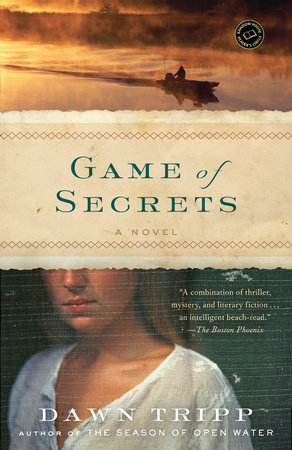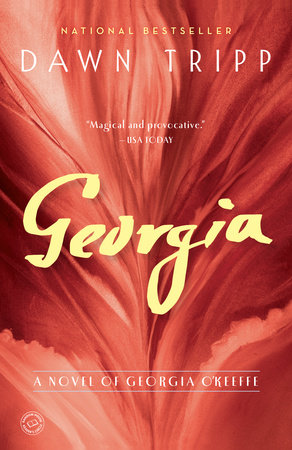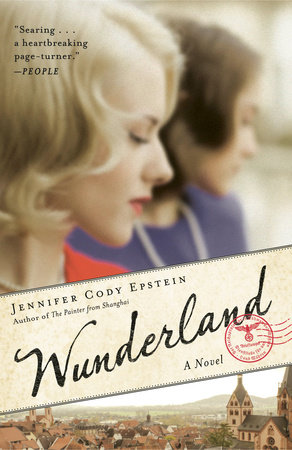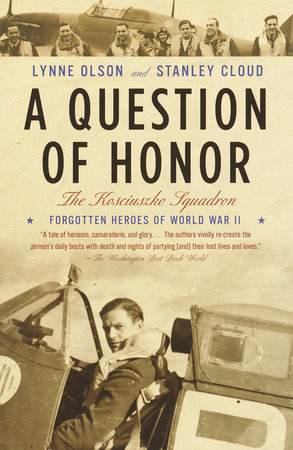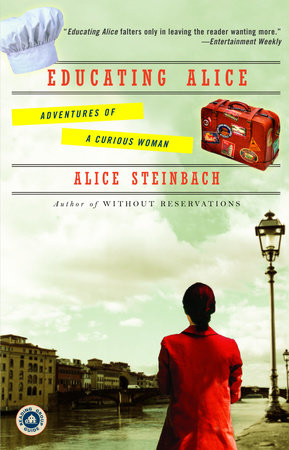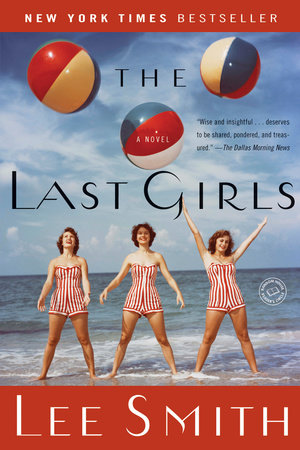A Conversation with Dawn Clifton Tripp, Author of
MOON TIDE
Q.What sparked the idea for MOON TIDE?
Dawn Clifton Tripp: MOON TIDE is a novel tht grew in me over time and out of my passion for the landscape of Westport, Massachusetts, where I summered growing up and where I now live. I knew that I wanted to write a story of love and class, a story of memory and desire. The character, Eve, had been with me for a while — the image of a child painting with food on the walls of her room because she could not express her vision or her grief in any other way. Jake came to me one day several years ago, while I was watching a man (whom is now my husband!) crawl around on the roof of the restaurant next door to my home, painting the awning. I had my first mental picture of Jake then, a young boy eeling on the river. That same summer, my grandmother was ill. I read to her, and I remember watching her face, deeply lined, her eyes half closed, half listening to me, half drifting off through old places. That night, I wrote the scene of Eve and Elizabeth in the library. I began to read about the Great Hurricane of 1938 that leveled much of the New England coast, including Westport, and I knew that I wanted to write toward that cataclysmic event. I built the story from that point.
Q.What about New England’s environment do you find so compelling?
DCT:There are two particular aspects of New England that influenced MOON TIDE. First, I am in love with the landscape here. I love the climate, the tides, the change of seasons, the sky, the light. I love the harshness of the winters and the storms that alter the shape of the marsh, the river channel and the dunes. I love how weather in New England can be fierce one day, calm the next. I live on a barrier beach, and I love the toughness of the plants and creatures that survive here. I also love the solitude.
The second aspect is class tensions which seem to run deeper in New England than other parts of the country. Class is a force, particularly in small towns, that can be damaging and intensely pervasive. When I speak of class tensions, I include both the subtle and overt, between blue-collar workers and the people who hire them; the assumptions that each make about the other; in a coastal community, tensions between the locals and summer residents. In many respects class is like weather — implicit in every relationship, in every exchange.
Q.You use nature, particularly the Hurrican of 1938 as a driving force in both the action and the emotional undercurrent of the novel. What drew you to this idea and how did you go about executing it?
DCT:To me, the nature is intensely alive. I have a sort of rough faith that the nature functions according to a logic and a will that we cannot, because of our humanness, completely understand. We try to predict its behavior, pin it down with calculations and science. But in the end, nature is wild, and it eludes us.
The character of Maggie is the closest to the storm. She and the hurricane take a similar path. She is a stranger, arrives in town in a similar way and there is a sense, by the end of MOON TIDE, that she is just passing through. Like the storm, she is not from the town, she is not rooted there. She is closer to the workings of the natural world than the others. And she is the one character I still feel spooking around me.
Q.How do you shape your characters?
DCT: Elizabeth is a character I have always wanted to write. An older woman who looks back on her life with longing and regret, who sees that she did not make the choices that she needed to make. There was a door she did not go through and did not live her life as fully as she might have as a result.
This is my greatest fear and has been for as long as I can remember. That I would get to Elizabeth’s age, that I would reach the end of my life with so much left undone. And so I began to write this woman. At a certain point, however, I realized that she was arriving at understandings that were beyond me. They were not understandings I had created for her. They were understandings she was leading me to.
Maggie was the hardest character to write because the depth of her experience and knowledge of human nature and the natural world is fathoms beyond me.
Jake was inspired by my husband. Not so much with regard to the details of his life but his essence. In the course of the book, Jake is the one character who is deep and steady and clear. In a sense, he is the wisest–he lives in his body, he lives in the world, rather than his head. He stays true to what he wants. And in the ends, it comes to him.
Q.Let’s talk about some of the other themes–memory, longing and redemption.
DCT:I wanted to explore the different shapes desire can take. For me the backbone of the novel was Jake’s longing for Eve–a longing so simple and singular and deep, it becomes almost magnetic. At the opposite extreme Jake’s brother Wes’s desire for Maggie in possessive and consuming. It grows twisted and goes awry; it triggers small cruelties and then a staggering act of violence.
Longing for place is everywhere throughout the book — and memory is a vehicle for that. Maggie’s memory of the Central American world she came from–her past that she culls through until it is worn and she can leave it behind. Eve’s mother’s odd death is linked to her desire to return to the Western Australian bush where she was raised. For me, the most poignant longing of the novel is Elizabeth’s. Her longing for Ireland. Her longing for God. Her longing for old moments in her life where she might have made a different choice. As I was writing Elizabeth, I often thought of the phrase “the sin of the unlived life.” But what I sense Elizabeth discovers by the end of the book, is that all of the deepest emotions that longing inspires–regret, fear, shame, passion, sadness, grief, and sometimes joy–to feel all of that at once is an act of aliveness.
Desire is the terrain in the heart that is most wild. It can cripple or destroy us, as it does Wes. But for Elizabeth, her desire is her salvation. She let’s herself go, and it is that letting go, into her longing, into her life, that sets her free.
Q.Writers often “write what they know” but in historical fiction, like MOON TIDE, an author must strike a balance between personal experience and historical research to make the book both credible and compelling. What research went into MOON TIDE and what process did you go through to reconcile historical fact with literary fiction?
A.The adage of “write what you know” has never exactly worked for me, unless you are willing to bend the definition of knowing. Sometimes I feel I know my characters better than I know the people in my life! I know their secrets, their fears, their hungers. I know the smells, sounds, sights of their world. I fall in love with them, and I carry them around in my head. They are just behind me, throughout my day. Sometimes I see them, hear them. Not as hallucination, I just sense them there.
I write what I am compelled by, what I am desperate to write. I also go to places that make me uncomfortable and afraid so I can write into the underside of things. I explore, in some instances, worlds that are alien, different, strange, often to discover what I don’t know. To embark on a novel, I have to be intensely passionate about the characters and the world I’m writing about because a novel can take years to complete, and you spend every day with the characters and their story.
When I decided to set MOON TIDE in the first part of the 1900s, I began to read everything I could find about the history of Westport. I scavenged local bookstores, local libraries. I read (and read and read!) less for historical fact and more to get a feel for the traditions, the landscape, the rhythms of day-to-day life as it was back then. And fortunately, there are still a few old-timers left who I could talk to about the storm. The facts created the spine for MOON TIDE but at I certain point, I took a step back from them and let the story create itself around the history.
Q.One senses an almost biblical subtext in the book–Blackwood’s rib, the apocalyptic storm/fllod, the notion that an entire community can rise from a land littered with stones, and the birth/rebirth of Eve. Were you aware of these themes while you were writing the book?
DCT:I didn’t intent a biblical subtext, although I’m not surprised that one can draw out those images and themes. I would say that the spirituality of the story as a whole is tied to nature rather than religious. Elizabeth’s story, however, is intensely religious. She was born into a faith. She has carried that faith without questioning it for most of her life–and it is not until her old age that her doubts begin to nip at her. As she senses her own death approach, her faith begins to unravel. That struggle, of God or no God, is the hinge her story rests upon. In my opinion, that is the most compelling struggle to spend time in and explore. (End)






